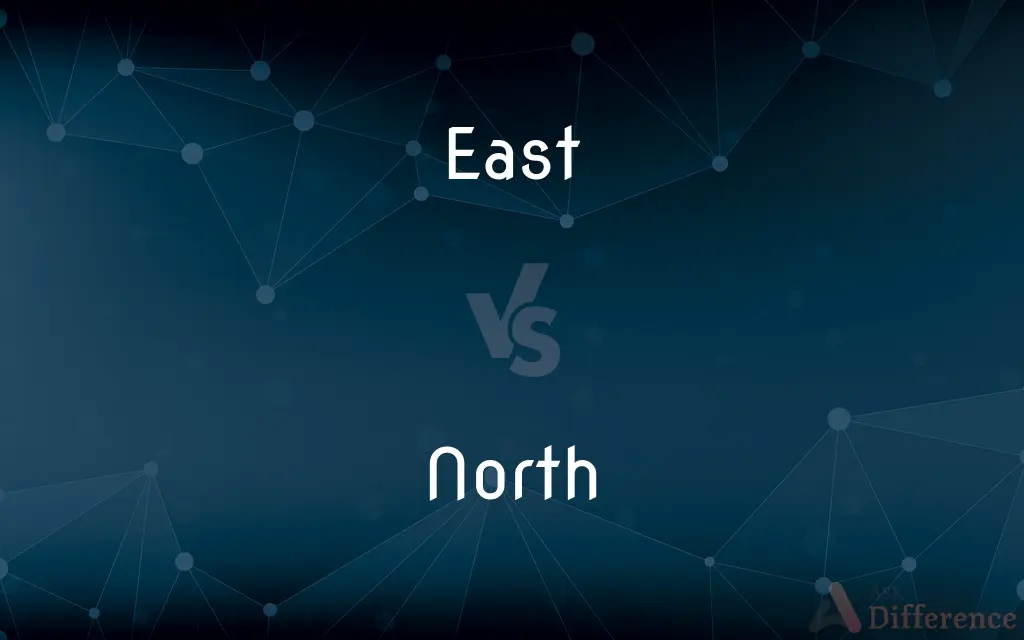East vs. North — What's the Difference?
Edited by Tayyaba Rehman — By Fiza Rafique — Updated on April 3, 2024
East is the direction from which the sun rises, associated with beginnings, while North is known for its cold, guiding star, and magnetic orientation.

Difference Between East and North
Table of Contents
ADVERTISEMENT
Key Differences
East, representing the direction of sunrise and new beginnings, plays a vital role in various cultural and geographical contexts, symbolizing growth and renewal. On the other hand, North, associated with the North Star and magnetic north, serves as a crucial navigational guide, often linked with cold climates and steadfastness. These cardinal directions not only assist in navigation but also hold significant symbolic meanings across different cultures.
In navigation, East is crucial for understanding geographic orientation, especially noted for its role in the naming of the Eastern Hemisphere. It is the opposite direction of west and is key in determining directions on maps and compasses. Whereas North, distinguished by the North Pole and the magnetic north, is fundamental in compass-based navigation, serving as a fixed point from which other directions are determined. Its prominence in navigation systems underscores its significance in global orientation and travel.
Culturally, East often embodies concepts of enlightenment and rebirth, observed in traditions and beliefs around the world. It is celebrated in various religions and philosophies for its association with light and life. Conversely, North has been historically associated with darkness, mystery, and often, strength, due to its extreme climates and the visibility of the North Star, which has been a symbol of guidance and constancy in many cultures. These contrasting symbolic associations reflect the diverse ways humans relate to the cardinal directions.
Climatically, regions located in the Eastern parts of continents tend to experience specific weather patterns influenced by their geographic position, such as the monsoons in South and Southeast Asia. On the contrary, northern regions of the globe are often characterized by colder climates, with the Arctic Circle encompassing some of the coldest areas on Earth. These climatic differences highlight the distinct environmental conditions associated with each direction.
In terms of their influence on global politics and economics, the East and the North can represent different geopolitical regions. The term "East" has been used to describe Asia and its economies, often in contrast to the West, symbolizing a division based on cultural, economic, and political differences. Meanwhile, "North" in geopolitical terms often refers to the developed, industrialized nations, predominantly located in the Northern Hemisphere, contrasting with the "Global South." This usage reflects global economic and political disparities and alignments.
ADVERTISEMENT
Comparison Chart
Symbolism
Beginnings, enlightenment, renewal
Guidance, steadfastness, cold
Navigation
Direction of sunrise, Eastern Hemisphere
North Pole, magnetic north
Cultural Significance
Light, life, rebirth
Darkness, mystery, strength
Climatic Patterns
Influences weather patterns, like monsoons
Characterized by colder climates
Geopolitical Connotations
Often represents Asia or Eastern economies
Developed, industrialized nations
Compare with Definitions
East
Direction from which the sun rises, symbolizing new beginnings.
Many cultures face east during certain rituals to welcome enlightenment.
North
Direction associated with the North Star, used for navigation.
Sailors have relied on the North Star for centuries to find their way.
East
Represents the Eastern Hemisphere in geography.
The East is home to diverse cultures and ancient civilizations.
North
Known for its cold climates and polar regions.
The North is characterized by its ice-covered landscapes in the Arctic.
East
Associated with specific weather patterns, like monsoons.
Eastern coasts often receive heavy rainfall due to monsoon winds.
North
In culture, often symbolizes strength and mystery.
Norse mythology places significant importance on the northern realms.
East
In geopolitics, sometimes refers to Asia or Eastern economies.
The East has seen rapid economic growth in recent decades.
North
Refers to developed, industrialized nations in geopolitics.
The Global North includes most of the world's wealthiest countries.
East
Symbolizes enlightenment and renewal in various traditions.
In feng shui, east is associated with health and family.
North
Represents steadfastness and guidance in symbolism.
The North Star has been a guiding light for navigators throughout history.
East
East is one of the four cardinal directions or points of the compass. It is the opposite direction from west.
North
North is one of the four compass points or cardinal directions. It is the opposite of south and is perpendicular to east and west.
East
The cardinal point on the mariner's compass 90° clockwise from due north and directly opposite west.
North
The direction along a meridian 90° counterclockwise from east; the direction to the left of sunrise.
East
The direction of the earth's axial rotation.
North
The cardinal point on the mariner's compass located at 0°.
East
An area or region lying in the east.
North
An area or region lying in the north.
East
The eastern part of the earth, especially eastern Asia.
North
The northern part of the earth.
East
The eastern part of a region or country.
North
The northern part of a region or country.
East
The region of the United States east of the Allegheny Mountains and north of the Mason-Dixon Line.
North
North The northern part of the United States, especially the states that fought for the Union in the Civil War.
East
The former Communist bloc of countries in Asia and especially in Eastern Europe.
North
The side of a church which is to the left as one faces the altar. Also called liturgical north.
East
The end of a church at which the altar is located. Also called liturgical east.
North
To, toward, of, facing, or in the north.
East
To, toward, of, facing, or in the east
The east bank of the river.
North
Originating in or coming from the north
A cold north wind.
East
Originating in or coming from the east
A cool east wind.
North
In, from, or toward the north.
East
In, from, or toward the east
A river flowing east.
North
(Slang) Into a better condition, as of increased value
An investment that went steadily north until the market crash.
East
One of the four principal compass points, specifically 90°, conventionally directed to the right on maps; the direction of the rising sun at an equinox.
Portsmouth is to the east of Southampton.
We live in the east of the country.
North
One of the four principal compass points, specifically 0° (being directed towards the North Pole); conventionally upwards on a map.
Minnesota is in the north of the USA.
East
The eastern region or area; the inhabitants thereof.
North
The up or positive direction.
Stock prices are heading back towards the north.
East
(ecclesiastical) In a church: the direction of the altar and chancel; the direction faced by the priest when celebrating ad orientem.
North
(physics) The positive or north pole of a magnet, which seeks the magnetic pole near Earth's geographic North Pole (which, for its magnetic properties, is a south pole).
East
Situated or lying in or towards the east; eastward.
North
(ecclesiastical) In a church: the direction to the left-hand side of a person facing the altar.
East
(meteorology) Blowing (as wind) from the east.
North
Of or pertaining to the north; northern.
He lived in north Germany.
She entered through the north gate.
East
Of or pertaining to the east; eastern.
North
Toward the north; northward.
East
From the East; oriental.
North
(meteorology) Of wind, from the north.
The north wind was cold.
East
(ecclesiastical) Designating, or situated in, the liturgical east.
The east front of a cathedral
North
Pertaining to the part of a corridor used by northbound traffic.
North highway 1
East
Towards the east; eastwards
North
(ecclesiastical) Designating, or situated in, the liturgical north (in a church, the direction to the left-hand side of a person facing the altar).
East
The point in the heavens where the sun is seen to rise at the equinox, or the corresponding point on the earth; that one of the four cardinal points of the compass which is in a direction at right angles to that of north and south, and which is toward the right hand of one who faces the north; the point directly opposite to the west.
The east began kindle.
North
(colloquial) More or greater than.
The wedding ended up costing north of $50,000.
East
The eastern parts of the earth; the regions or countries which lie east of Europe; the orient. In this indefinite sense, the word is applied to Asia Minor, Syria, Chaldea, Persia, India, China, etc.; as, the riches of the East; the diamonds and pearls of the East; the kings of the East.
The gorgeous East, with richest hand,Showers on her kings barbaric pearl and gold.
North
Toward the north; northward; northerly.
Switzerland is north of Italy.
We headed north.
East
Formerly, the part of the United States east of the Alleghany Mountains, esp. the Eastern, or New England, States; now, commonly, the whole region east of the Mississippi River, esp. that which is north of Maryland and the Ohio River; - usually with the definite article; as, the commerce of the East is not independent of the agriculture of the West.
North
To turn or move toward the north.
East
Toward the rising sun; or toward the point where the sun rises when in the equinoctial; as, the east gate; the east border; the east side; the east wind is a wind that blows from the east.
North
That one of the four cardinal points of the compass, at any place, which lies in the direction of the true meridian, and to the left hand of a person facing the east; the direction opposite to the south.
East
Designating, or situated in, that part of a church which contains the choir or chancel; as, the east front of a cathedral.
North
Any country or region situated farther to the north than another; the northern section of a country.
East
Eastward.
North
Specifically: That part of the United States lying north of Mason and Dixon's line. See under Line.
East
To move toward the east; to veer from the north or south toward the east; to orientate.
North
Lying toward the north; situated at the north, or in a northern direction from the point of observation or reckoning; proceeding toward the north, or coming from the north.
East
The cardinal compass point that is at 90 degrees
North
To turn or move toward the north; to veer from the east or west toward the north.
East
The countries of Asia
North
Northward.
East
The region of the United States lying north of the Ohio River and east of the Mississippi River
North
The region of the United States lying north of the Mason-Dixon Line
East
Situated in or facing or moving toward the east
North
The United States (especially the northern states during the American Civil War);
He has visited every state in the Union
Lee hoped to detach Maryland from the Union
The North's superior resources turned the scale
East
To, toward, or in the east;
We travelled east for several miles
North
The cardinal compass point that is at 0 or 360 degrees
North
Any region lying in or toward the north
North
The direction in which a compass needle points
North
British statesman under George III whose policies led to rebellion in the American colonies (1732-1792)
North
Situated in or facing or moving toward or coming from the north;
Artists like north light
The north portico
North
In a northern direction;
They earn more up north
Let's go north!
Common Curiosities
Can "East" and "North" have geopolitical meanings?
Yes, "East" and "North" can refer to geopolitical divisions, with the East often denoting Asia or Eastern economies, and the North indicating developed, industrialized nations.
How do navigation techniques differ when using East and North?
Navigation techniques differ as East is used for general orientation, while North is crucial for precision navigation using the North Star and magnetic north.
Are there any specific festivals associated with East or North?
Yes, various cultures have festivals celebrating the cardinal directions, with some honoring the East for its association with renewal and the North for its significance in astronomy and navigation.
Why is the East important in geopolitics?
The East is important in geopolitics for its economic growth, strategic location, and as a contrast to Western economic and political models.
What is the significance of the North Star?
The North Star is significant for its near-fixed position in the sky, serving as a reliable guide for navigation through centuries.
How do Eastern and Northern climates influence local cultures?
Climates influence local cultures through lifestyle adaptations, traditional practices, and economic activities suited to the environmental conditions.
What makes the North important for navigation?
The North is important for navigation due to the North Star and magnetic north, providing a fixed point for orientation.
How do cultural interpretations of East and North differ?
Cultural interpretations vary, with the East often symbolizing enlightenment and rebirth, and the North representing strength, mystery, and guidance.
Why are the climates of East and North different?
Climates differ due to geographical location, with Eastern regions experiencing patterns like monsoons, and Northern areas having colder, polar climates.
Why is the East associated with beginnings?
The East is associated with beginnings due to the sunrise, symbolizing renewal and the start of a new day.
What role does the Arctic play in understanding the North?
The Arctic plays a key role in understanding the North due to its extreme climate, unique ecosystems, and geopolitical importance for resources and navigation.
Is there a symbolic meaning to facing East in religious practices?
Facing East in religious practices often symbolizes facing the light, seeking enlightenment, and welcoming the new day or beginnings.
How does the concept of the Global North affect international relations?
The concept of the Global North affects international relations by highlighting economic disparities and fostering discussions on development, aid, and cooperation.
Can the orientation towards East or North influence architecture?
Yes, architectural orientation towards East or North can influence design for reasons such as sunlight exposure, wind patterns, and cultural significance.
Share Your Discovery

Previous Comparison
Bagel vs. Doughnut
Next Comparison
Support vs. SustainAuthor Spotlight
Written by
Fiza RafiqueFiza Rafique is a skilled content writer at AskDifference.com, where she meticulously refines and enhances written pieces. Drawing from her vast editorial expertise, Fiza ensures clarity, accuracy, and precision in every article. Passionate about language, she continually seeks to elevate the quality of content for readers worldwide.
Edited by
Tayyaba RehmanTayyaba Rehman is a distinguished writer, currently serving as a primary contributor to askdifference.com. As a researcher in semantics and etymology, Tayyaba's passion for the complexity of languages and their distinctions has found a perfect home on the platform. Tayyaba delves into the intricacies of language, distinguishing between commonly confused words and phrases, thereby providing clarity for readers worldwide.
















































